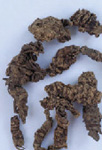

Dried rhizomes of spikenard, or nard, Nardostachys jatamansi, sold as medicine in Peshawar, Pakistan.
THOUGH CITED IN ONLY THREE places in the Bible, spikenard, or nard, Nardostachys jatamansi, is one of the better-known perfumed plants of the scriptures. In Solomon’s Song, nard is included in a garden of sensuous delight, to which the Lover compares his Beloved: “Your plants are an orchard of pomegranates with choice fruits, with henna and nard, nard and saffron, calamus and cinnamon, with every kind of incense tree, with myrrh and aloes and all the finest spices” (Song of Solomon 4:13–15, NIV).
Better known is the reference in Jesus’s life: “Then Mary took about a pint of pure nard, an expensive perfume; she poured it on Jesus’s feet and wiped his feet with her hair. And the house was filled with the fragrance of the perfume. But one of his disciples, Judas Iscariot, who was later to betray him, objected, ‘Why was not this perfume sold and the money given to the poor? It was worth a year’s wages’” (John 12:3–5; Mark 14:3; NIV). The worth of the ointment was great in ancient times. Nard was traded extensively (Miller 1969). And the plant and its products are highly valued today, especially in ayurvedic medicine.
Because of demand for the plant in India and other countries, there is concern over exploitation of this Himalayan species (Larsen 2005). Nard is rhizomatous and the parts used include the rhizome and some times the leaves, which means the entire plant is destroyed. The dried rhizome is used for a variety of remedies, and an oil is extracted from it as well.
Nard belongs to a group of plants like frankincense, myrrh, and thyine, which were widely used in the Middle East though not cultivated there.

Herbalist in Peshawar, Pakistan, discussing the benefits of nard, Nardostachys jatamansi, which is highly valued throughout the Himalayan region for its putative medicinal value. Courtesy T. Robert Sampson.